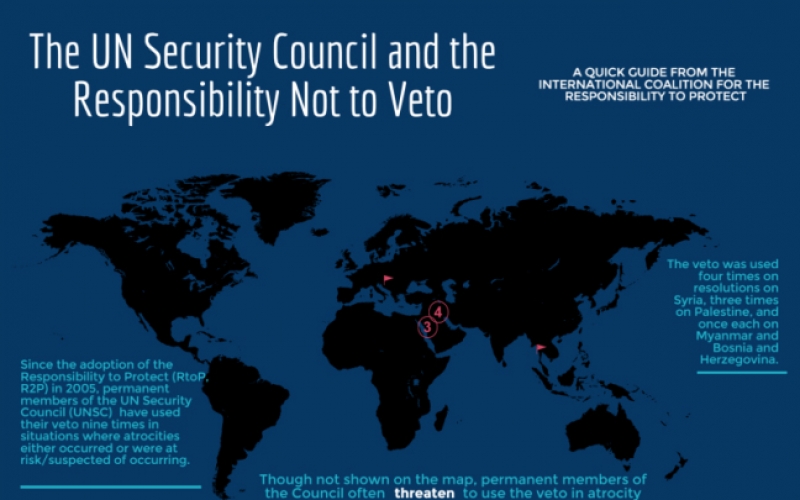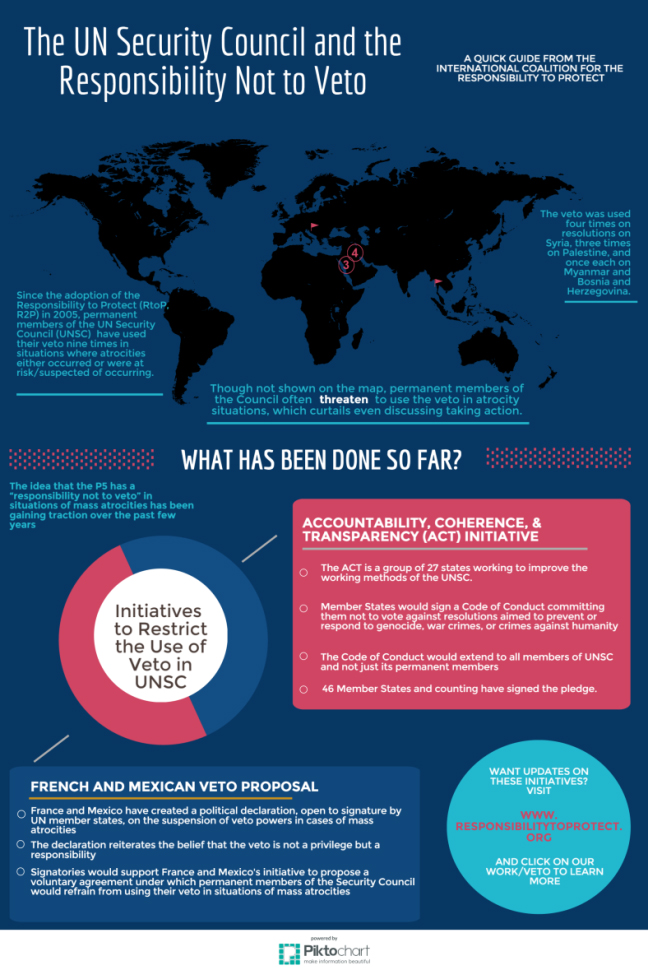UN Security Council: The responsibility not to veto

Syria vetoes highlight need for UN Security Council reform
Although the word “veto” never appears in the UN Charter, its wielding by the five permanent members of the UN Security Council—particularly in situations of atrocities—can have an outsize effect on the UN’s legitimacy and hamper the pursuit of justice for victims of such crimes.
Many have accused the UN’s structure and working methods, set up in the aftermath of World War II, of being outdated, unrepresentative, and unreflective of the modern international system. Yet no single process has done more to damage the UN’s credibility—in crises such as Syria, Palestine, and Myanmar—than the use of the veto by China, France, Russia, the United Kingdom, or the United States.
The crisis in Syria, which has now caused 3.8 million to flee, internally displaced 7.6 million, and killed over 200,000, is a grim reminder of what can and does happen to populations when the veto is used or threatened.
Of course, Security Council vetoes on the Syrian crisis cannot be entirely blamed for crimes which, in the words of Secretary-General Ban Ki-moon, should “shock the global conscience.” However, it is not far-fetched to say that we would be closer to a political solution to the crisis had Russia and China not vetoed four resolutions on Syria, drafts which ranged from condemning human rights violations to threatening sanctions to renewing the deployment of ceasefire monitors.
The use of the veto also cripples efforts to ensure justice and accountability for the perpetrators of genocide, crimes against humanity, and war crimes. For example, one vetoed resolution on Syria would have ended the long run of impunity (enjoyed by both sides to the conflict for crimes against humanity and war crimes) by referring the situation to the International Criminal Court (ICC). This week the Secretary-General for the first time called on governments to refer the situation in Syria to the ICC.
More recently, in July 2015 Russia vetoed a resolution that would have recognized the 1995 Srebrenica massacre as a genocide. As the Coalition for the ICC Convenor William Pace underscored, “by vetoing the resolution, Russia has erected a new barrier to reconciliation and remembrance. Acknowledging the truth of what happened—and how we let it happen—is the only way to honor the victims, live up to our Responsibility to Protect, and prevent future genocides.”
So what can be done? The four vetoes on Syria have given momentum to government-led attempts to change the way the veto is used in situations of genocide, war crimes, or crimes against humanity.
The ACT Code of Conduct and the France/Mexico initiative

Both the ACT Code of Conduct and the France/Mexico political declaration on the veto are to be formally presented at UN headquarters in New York during the annual opening of the General Assembly this week. France and Mexico will hold a meeting on 30 September to raise awareness among governments, civil society, and the media of the political declaration. The next day, on 1 October, the ACT group will introduce and debate the Code of Conduct, which will be followed by the Code’s formal “launch” on 23 October, on the occasion of the 70th anniversary of the United Nations.
A significant number of governments have already backed these efforts—at the recent General Assembly dialogue on the Responsibility to Protect on 8 September, thirty-four governments expressed their frustration at the reckless manner with which Permanent Members used their veto power by announcing support for veto restraint. At various other UN meetings, a total of sixty-seven governments have spoken out on the need to limit the veto in situations of mass atrocities.
Putting justice above international politics
Will either of these initiatives make it impossible for the permanent members to use their veto? No. Even if the permanent members pledged their support to the French/Mexican initiative or the ACT Code of Conduct, neither is legally binding.
However, with enough pressure, both initiatives can increase the political cost of using the veto and intensify the international isolation of those states who wield such power irresponsibly. This is why you, or your civil society organization, should call for your government to pledge its support.
As stated in a letter by 34 civil society organizations, by lending their support to these new initiatives, “states can help ensure that politics will no longer trump the protection of populations within the UN Security Council.”
Angela Patnode is a Communications and Advocacy Officer at the International Coalition for the Responsibility to Protect
See also: Veto of justice for Syria highlights need for Security Council reform
Sign up for our weekly updates for the latest #GlobalJustice news.
